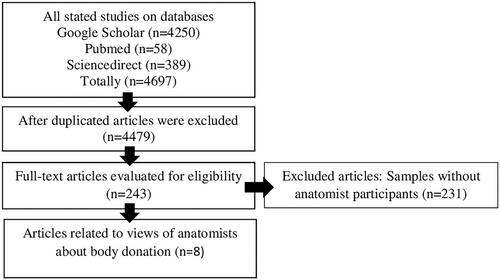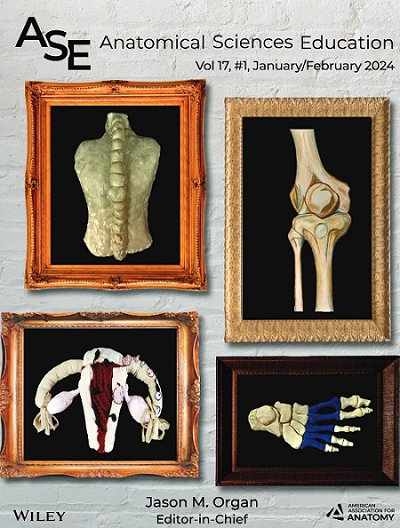下载PDF
{"title":"Turkish anatomists' preferences to continue teaching after death and how it is impacted by their religious beliefs","authors":"Begumhan Turhan, Melike Akcaalan, Menekse Karahan","doi":"10.1002/ase.2339","DOIUrl":null,"url":null,"abstract":"<p>The attitudes of anatomists toward donating their own bodies are a question of matter in the literature of medicine. The aim of the study was to evaluate the attitudes of Turkish anatomists regarding the donation of their own bodies as teaching material after death. A descriptive cross-sectional study was conducted among anatomists in Türkiye during the months of March and April 2023. An online survey was carried out by means of a questionnaire constructed using Google Forms©. The survey consisted of a demographic data part, Likert-type multiple choice questions, open-ended questions, and yes–no questions. The questionnaire was answered by 133 anatomists from the anatomy departments in Türkiye. The mean age was 38.9 ± 7.30 years. 48% of the anatomists who answered were male and 52% were female. Most of the participants have a religious belief (90%). All of the participants with religious beliefs were members of the Islamic religion. Approximately 5% of the participants stated that they donated their bodies as cadavers. Anatomists suggested increasing body donation by 76.7% as a solution to cadaveric insufficiency. Although most anatomists state that there is a need for body donation, the rate of donating their own bodies seems quite low. We think that anatomists accept the importance of body donation, but they do not think of themselves as donors. They only recommend body donation to other people. We think that programs and activities should be planned especially for those who are uncertain about body donation and those who only donate organs but do not donate bodies.</p>","PeriodicalId":124,"journal":{"name":"Anatomical Sciences Education","volume":"17 8","pages":"1579-1585"},"PeriodicalIF":5.2000,"publicationDate":"2023-09-23","publicationTypes":"Journal Article","fieldsOfStudy":null,"isOpenAccess":false,"openAccessPdf":"https://onlinelibrary.wiley.com/doi/epdf/10.1002/ase.2339","citationCount":"0","resultStr":null,"platform":"Semanticscholar","paperid":null,"PeriodicalName":"Anatomical Sciences Education","FirstCategoryId":"95","ListUrlMain":"https://onlinelibrary.wiley.com/doi/10.1002/ase.2339","RegionNum":2,"RegionCategory":"教育学","ArticlePicture":[],"TitleCN":null,"AbstractTextCN":null,"PMCID":null,"EPubDate":"","PubModel":"","JCR":"Q1","JCRName":"EDUCATION, SCIENTIFIC DISCIPLINES","Score":null,"Total":0}
引用次数: 0
引用
批量引用
Abstract
The attitudes of anatomists toward donating their own bodies are a question of matter in the literature of medicine. The aim of the study was to evaluate the attitudes of Turkish anatomists regarding the donation of their own bodies as teaching material after death. A descriptive cross-sectional study was conducted among anatomists in Türkiye during the months of March and April 2023. An online survey was carried out by means of a questionnaire constructed using Google Forms©. The survey consisted of a demographic data part, Likert-type multiple choice questions, open-ended questions, and yes–no questions. The questionnaire was answered by 133 anatomists from the anatomy departments in Türkiye. The mean age was 38.9 ± 7.30 years. 48% of the anatomists who answered were male and 52% were female. Most of the participants have a religious belief (90%). All of the participants with religious beliefs were members of the Islamic religion. Approximately 5% of the participants stated that they donated their bodies as cadavers. Anatomists suggested increasing body donation by 76.7% as a solution to cadaveric insufficiency. Although most anatomists state that there is a need for body donation, the rate of donating their own bodies seems quite low. We think that anatomists accept the importance of body donation, but they do not think of themselves as donors. They only recommend body donation to other people. We think that programs and activities should be planned especially for those who are uncertain about body donation and those who only donate organs but do not donate bodies.
土耳其解剖学家死后继续教学的偏好,以及这是如何受到他们宗教信仰的影响的。
解剖学家对捐献自己身体的态度是医学文献中的一个问题。这项研究的目的是评估土耳其解剖学家对死后捐献自己的尸体作为教材的态度。2023年3月和4月,在土耳其解剖学家中进行了一项描述性横断面研究。一项在线调查是通过使用Google Forms©构建的问卷进行的。该调查包括人口统计数据部分、Likert型多项选择题、开放式问题和是非问题。这份问卷由来自土耳其解剖部门的133名解剖学家回答。平均年龄38.9岁 ± 7.30 年。回答的解剖学家中48%是男性,52%是女性。大多数参与者都有宗教信仰(90%)。所有有宗教信仰的参与者都是伊斯兰教徒。大约5%的参与者表示,他们将自己的尸体作为尸体捐献。解剖学家建议将尸体捐献增加76.7%,以解决尸体功能不全的问题。尽管大多数解剖学家都表示需要捐献遗体,但捐献自己遗体的比率似乎很低。我们认为解剖学家接受遗体捐献的重要性,但他们并不认为自己是捐献者。他们只建议将遗体捐献给其他人。我们认为,应该特别为那些对遗体捐献不确定的人和那些只捐献器官而不捐献遗体的人规划计划和活动。
本文章由计算机程序翻译,如有差异,请以英文原文为准。



